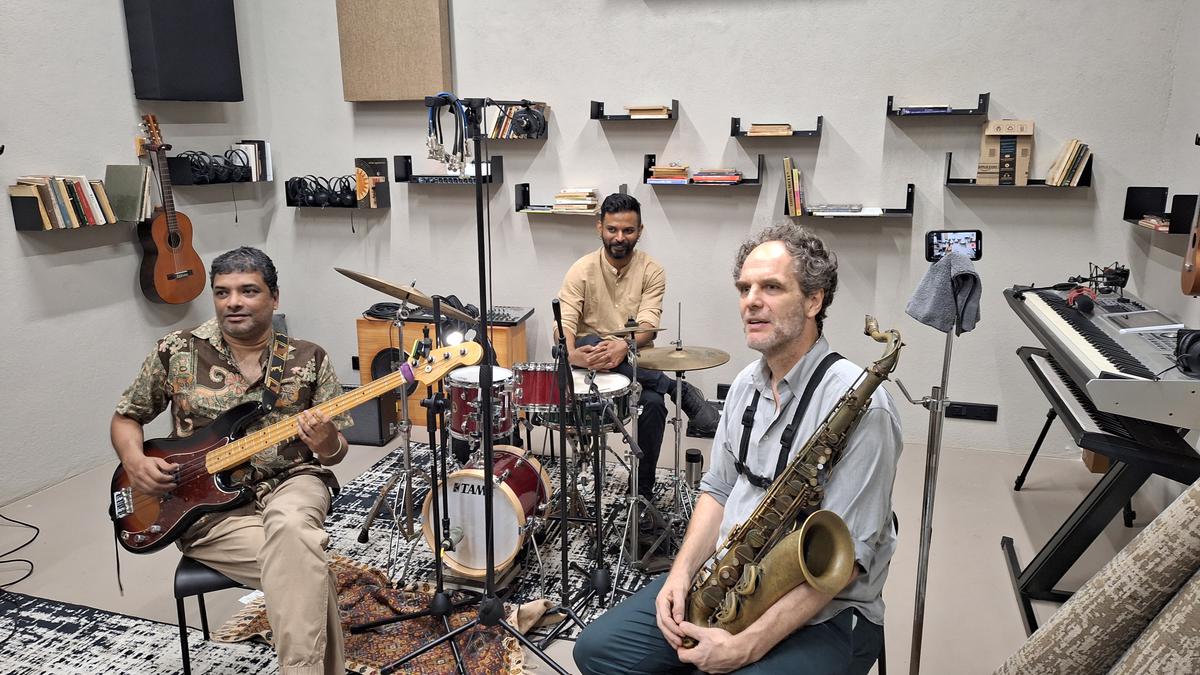
Chennai band Many Things releases its debut album that fuses jazz, rock, classical and funk music
The Hindu
Chennai-based cross-genre band Many Things is all set to release its debut album First Things First on July 6, one year into its formation
There is feverish tension in the air as the tempo of the song builds from a gentle hum to a roaring crescendo. Then, unexpectedly, the tempo and melody switch and the song heads in an entirely different direction. It is quite a nifty little switch, but Chennai-based cross-genre instrumental band, Many Things, executes this transition seamlessly.
Consisting of saxophonist and composer Maarten Visser, bassist Aravind Murali, and drummer Manukrishnan, this ensemble crafts compositions that fuse genres such as jazz, rock, classical, and funk. Founded over a year ago, they are now set to release their debut album First Things First on July 6.
“I always say that Many Things’ music is best when heard live,” says Aravind Murali, referring to the improvisational nature of their performances. Each of their songs have a loose structure, guided only by a composition that they tweak each time they play. This ensures that no song is played in exactly the same way twice.
This improvisational performance style is a refreshing addition to the Chennai music scene, borrowing its spontaneity from strong jazz influences. The songs themselves are concepts aiming to capture a certain emotion, and are hence given vague, yet simple titles (Tricky Thing, Swing Thing, Joint Thing).
The band’s influences are the members’ own musical backgrounds. With Visser’s compositions incorporating Murali’s unique bass-playing style and Manukrishnan’s metal and Carnatic backgrounds, the resulting sound sits outside the labels of genre and becomes something that is uniquely their own.
Recorded in April, its debut album First Things First is inspired by this unique style of composition. Reluctant to be defined by a particular genre or label, the avant garde trio describes its music as contemporary-improvisational
“Our music,” says Maarten Visser, “was never meant to be recorded, just played.” As they are all experienced in their own fields, each of their musical personas comes together in synergy as they perform live.

“Writing, in general, is a very solitary process,” says Yauvanika Chopra, Associate Director at The New India Foundation (NIF), which, earlier this year, announced the 12th edition of its NIF Book Fellowships for research and scholarship about Indian history after Independence. While authors, in general, are built for it, it can still get very lonely, says Chopra, pointing out that the fellowship’s community support is as valuable as the monetary benefits it offers. “There is a solid community of NIF fellows, trustees, language experts, jury members, all of whom are incredibly competent,” she says. “They really help make authors feel supported from manuscript to publication, so you never feel like you’re struggling through isolation.”

Several principals of government and private schools in Delhi on Tuesday said the Directorate of Education (DoE) circular from a day earlier, directing schools to conduct classes in ‘hybrid’ mode, had caused confusion regarding day-to-day operations as they did not know how many students would return to school from Wednesday and how would teachers instruct in two modes — online and in person — at once. The DoE circular on Monday had also stated that the option to “exercise online mode of education, wherever available, shall vest with the students and their guardians”. Several schoolteachers also expressed confusion regarding the DoE order. A government schoolteacher said he was unsure of how to cope with the resumption of physical classes, given that the order directing government offices to ensure that 50% of the employees work from home is still in place. On Monday, the Commission for Air Quality Management in the National Capital Region and Adjoining Areas (CAQM) had, on the orders of the Supreme Court, directed schools in Delhi-NCR to shift classes to the hybrid mode, following which the DoE had issued the circular. The court had urged the Centre’s pollution watchdog to consider restarting physical classes due to many students missing out on the mid-day meals and lacking the necessary means to attend classes online. The CAQM had, on November 20, asked schools in Delhi-NCR to shift to the online mode of teaching.









